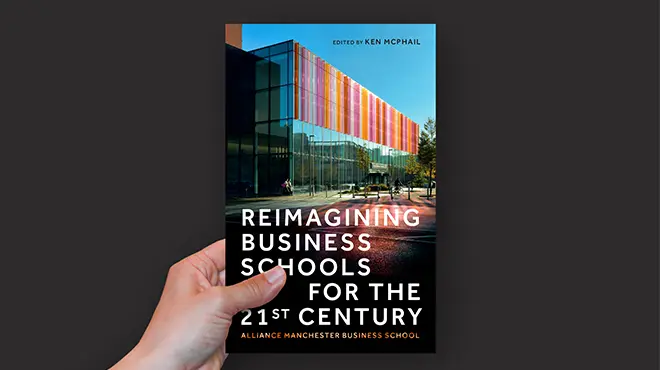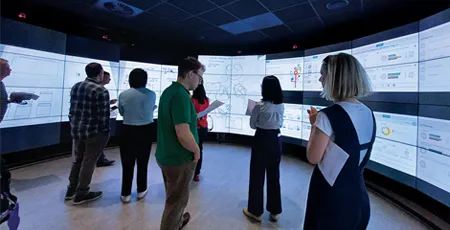Reimagining business schools for the 21st century
To mark its 60th anniversary in 2025 AMBS is publishing a collection of essays.
Co-authored by AMBS academics and business leaders, the thought-provoking book outlines the role that business schools can play in confronting local and global challenges.
Entitled 'Reimagining Business Schools for the 21st Century', the book also looks at how business schools can equip the next generation of business leaders with the skills they need to embrace these challenges and outline ideas for policy development.
The blueprint deliberately reaches out to the wider public and will help inform public and political debate on the role of business in both the causes and solutions to the world’s biggest challenges.
It also outlines how business and management research cannot just help address grand challenges such as climate change and regional inequalities, but also help generate economic growth, inform policy development, and define business thinking.
The essays also reiterate AMBS' foundational and longstanding position at the forefront of these debates, offering credible and lasting contributions, and staying true to its Original Thinking Applied ethos.
We outline the different chapters within the book and the specific challenges that each chapter seeks to tackle.
Introduction
The role of business schools in universities, the economy and society
Authors:
- Professor Duncan Ivison, President and Vice Chancellor, The University of Manchester
- Professor Ken McPhail, Head of AMBS.
Whether it's dealing with economic disparities, global geopolitical upheaval, climate change, or the impact of new technologies such as artificial intelligence, we are living in pivotal times. Many businesses are now larger and more influential than nation states and are perceived to have a crucial role in addressing these challenges.
Against this backdrop, business schools have a crucial role to play in research, discovery and understanding the nature of these political and democratic shifts and how to tackle these grand challenges.
They have a fundamental role to play in informing policy and helping future leaders deal with these challenges and drive economic growth, while also helping to build more equitable and sustainable societies.
This introductory chapter to the book discusses the transformative power of business research and education, and its potential for helping create more prosperity and opportunity for all.
If the purpose of business needs to be reimagined, business schools will need to change to be a major catalyst in this process … Calls for a more purpose driven, transformational response from business schools are gaining traction.
Chapter 1
Navigating the net zero transition
Authors:
- Frank W. Geels, Eddie Davies Professor of Sustainability Transitions, AMBS
- Sacha Sadan, Director of Sustainable Finance, Financial Conduct Authority and Honorary Professor, Alliance Manchester Business School.
Businesses used to be reluctant to address climate change mitigation, but now want to be on the front foot, reduce risk, and confront the climate crisis head-on.
In fact, we are now in the midst of a global innovation race where low-carbon transitions are accelerating in areas such as electricity and auto mobility, driven also by rising demand from policymakers for answers.
However, on the political and societal side there is some pushback against green technologies for reasons of affordability and the impact on existing jobs. This chapter explores what it will now take to see net zero ambitions fully realised in a just transition.
"Business schools are well placed to help address the challenges around low carbon transitions in various sectors and industries.
"But this requires business schools to understand low-carbon transitions as a cross-cutting challenge for organisations rather than as a specialised topic to be addressed by ESG (Environmental, Social, Governance) scholars."

Innovation has been central to the mission of the University of Manchester (UoM) ever since it was established 200 years ago.
Chapter 2
Catalysing Manchester’s innovation ecosystem to unlock economic growth
Author:
- Lou Cordwell, CEO of Unit M and Professor of Innovation and Special Advisor to the Office of the President and Vice-Chancellor, The University of Manchester.
The University of Manchester's scale and excellence in research, innovation and skills development, position it at the heart of Manchester’s next growth phase.
It also positions the University as a crucial delivery partner for the national Industrial Strategy in terms of ambitions around:
- Growing high-value clusters
- Creating high value spinouts and startups
- Supporting SMEs and scale-ups to adopt new technologies and skills
- Crowding in private investment in near-market R&D, and attracting private sector investment to the UK.
The University has specifically made catalysing growth for the North-West and the UK a strategic priority with the launch of Unit M, a new innovation capability, seed funded by the University, in order to lead this regional growth effort.
With a mandate to accelerate industry access to the university's extensive innovation assets, capabilities, and talent, Unit M aims to drive growth in startups and scale-ups, diffuse technologies into SMEs, and attract foreign direct investment to the region and the UK.
This chapter explores these themes and the key role that civic universities can more broadly play in terms of driving innovation in their regions.
"Innovation has been central to the mission of the University of Manchester (UoM) ever since it was established 200 years ago, and it continues to be just as critical today with the university the largest innovation asset in Manchester."
Chapter 3
Cities, regions and turning around the NorthAuthors
- Professor Philip McCann, Sir Terry Leahy Chair in Urban and Regional Economics, AMBS
- Sir Terry Leahy, AMBS alumnus and former Chancellor of The University of Manchester.
The UK has some of the largest regional productivity inequalities of any developed country, and these have an acute impact on prosperity, social mobility, quality of life and life expectancy across the country.
Tackling these disparities will be key to unlocking the country's growth potential - but doing so will require thorough, extensive research into the key drivers of regional productivity inequalities and what can be done to solve them.
In this chapter one of Britain's leading business figures, Sir Terry Leahy, is joined by Philip McCann to discuss the vital role that research can play in helping inform policymaking and fashioning the arguments for change.
“Regalvanising and regenerating northern cities is a long and slow process which needs to be carefully constructed. Northern cities tend to be located very close to each other, so this offers the opportunity for building pan-northern economies based on the better coordination and linking of cities as a counterweight to the London agglomeration.”
Chapter 4
The future of finance: financial technology and innovation for growth
Authors:
- Dr. Catherine L. Mann, Honorary Professor, AMBS, Professor of Practice, Brandeis University, and external member of the Bank of England Monetary Policy Committee
- Professor Markos Zachariadis, Chair of Financial Technology (FinTech) & Information Systems and Founding Director of the Centre for Financial Technology Studies, AMBS.
This chapter reviews the evidence on the effect of financial technology and innovation adoption on economic growth and productivity in the financial services sector.
In doing so it highlights various emerging technologies that have contributed to the transformation of the financial services industry and the various institutions within, as well as having a huge impact on the global financial system.
The chapter also discusses the increasing challenges around data and development of open banking systems. It concludes with a discussion about what these trends mean for business school teaching and research, and the role of schools in debates over the control and ownership of the vast information generated today through financial transactions.
“Business schools are well positioned to ‘upskill’ and ‘reskill’ the workforce in order to tackle technological developments more effectively and learn how to utilise these for business growth and increased productivity.”
Chapter 5
The importance of management leadership as a force for better wellbeing
Authors:
- Sir Cary Cooper, 50th Anniversary Professor of Organisational Psychology and Health, AMBS
- Tera Allas CBE, Honorary Professor, AMBS.
Poor mental health, depression and stress are today’s biggest causes of absenteeism at work. At the same time the UK economy struggles with worker shortages and languishing productivity growth.
Yet one of the root causes of this epidemic continues to be ignored by far too many organisations. Indeed, the saying that people ‘don’t leave a job, they leave a boss’ continues to ring true for far too many employees suffering from poor wellbeing at work where negative feelings triggered by work spill over into their personal lives.
Business leaders have a huge role to play in improving the health and wellbeing of their employees. This chapter asks why, given the huge scale of the problem and enormous upside business potential, more isn't being done.
“The evolving workplace requires managers who are not only skilled in strategy but also attuned to the wellbeing of their teams.
"Business schools have a unique opportunity to prepare future leaders to meet this challenge by reshaping their curricula, inspiring ambitious visions for better workplaces, and fostering the personal growth necessary for behavioural change.”
Chapter 6
Tackling economic and societal challenges in Greater Manchester
Authors:
- Jill Rubery, Professor of Comparative Employment Systems, AMBS, and Executive Director of the Work and Equalities Institute
- Andy Westwood, Professor of Government Practice, University of Manchester.
The UK has huge and growing local and regional inequalities in health, education, public services and earnings/standards of living, and these differences have been increasing for over three decades.
Despite these challenges there are significant opportunities. Greater Manchester has been growing its economy at a faster rate than the UK in the last few years. And, at the same time, it has been a crucible for English devolution with new institutions such as the Mayor’s office and the Greater Manchester Combined Authority being created.
This chapter explores how Manchester has been a hotbed for ideas to drive economic growth and public service reform, and what it can do further to address societal challenges.
“If business schools are to make a difference to the cohesion and prosperity of the region in which they are located, issues of work and employment need to move up the agenda with more attention paid to the consequences of business strategies for productive lives.”
Chapter 7
Red pill or blue pill? Do we shape AI's future, or do we allow it to shape us?
Authors:
- Michelle Carter, Professor of Information Systems, AMBS
- Richard Allmendinger, Professor of Applied Artificial Intelligence, AMBS.
We live in an incredible time where only our imagination holds back what we can do with technology which is changing the world we live in and how we relate to one another.
Every day we hear about the ways in which AI is transforming business, but are we doing enough to ensure that AI impacts our everyday lives in truly beneficial ways? We are facing a curious conundrum in our modern lives with a widening chasm between the pace of technological change and our capacity as humans to adapt.
How do we equip students, and ourselves, with enduring digital skills that serve us not just now but well into our digitally-oriented futures?
“Original thinking is not just about discovering new knowledge, it’s about challenging assumptions and reimagining how knowledge is created, shared, and applied.
"If AI is to be a tool for progress rather than an obstacle, then universities and business schools must engage critically with it, ensuring it supports and doesn’t replace intellectual inquiry.”
Chapter 8
The creativity crisis in business schools: business, imagination and creativity
Authors:
- Bruce S. Tether, Professor of Innovation Management and Strategy, AMBS
- John McAuliffe, Professor of Poetry, and Director Creative Manchester, University of Manchester.
This chapter argues that at least two major problems are suppressing creativity in business schools, both of which relate to challenges of measurement which feed into incentives and behaviours. In teaching, creative contributions are hard to measure, while in research the targeting of top journal publications is encouraged which can distort behaviour.
Yet creativity is important for all business school stakeholders, and for students creativity is both intrinsically and extrinsically valuable. This chapter explores how enhancing creativity should be at the centre of universities and business schools, and how engaged, interdisciplinary teaching and research will always require ‘little C’ creativity.
“There are two broad arguments as to why creativity matters. One is top-down, which is that creativity is good for the economy, society and the planet. The other is bottom-up, which is that learning to be creative in pursuit of purposes or goals is life-enhancing and fulfilling.”
Chapter 9
What is the point of business school research?
Authors:
- Gerard P Hodgkinson, Professor of Strategic Management and Behavioural Science, AMBS
- Elvira Uyarra, Professor of Innovation Studies, AMBS.
Business schools need to focus their research activity more widely in response to pressing global challenges. However, at present researchers are over-incentivised to pursue theoretical and methodological rigour and advancement at the expense of engaging more deeply with the fundamental challenges of economy and society.
In short, there appears a fundamental disconnect between the overwhelming bulk of the research published in most highly prized academically focused research outlets, and the communities that stand to benefit most from insights. In this chapter the authors ask what can be done to fix this disconnect.
“In its quest to become an academically respectable subject, business and management studies has developed an effort-reward system that privileges theoretical scientific advancement over practical and policy relevance. This shortfall is particularly evident in areas where evidence-based insights are urgently needed.”
Chapter 10
The global business school in a 'slowbalised' world
Authors:
- Peter J. Buckley, 200th Anniversary Chair in International Business, AMBS
- Axèle Giroud, Professor of International Business, AMBS.
Against the backdrop of rising geopolitical tensions, increased economic nationalism, and wider consumer dissatisfaction with capitalism, these are challenging times for multinationals which are fundamentally dealing with three sets of problems.
Two of these — how to remain competitive in their markets, and how to deal with state interference — are not new. But a third challenge, how to deal with the pressures of civil society, is not. All these trends chime with a fundamental upending of the multinational model, driven by the rise of e-commerce, digitisation, and the platform economy. How should business schools respond to these transformative changes?
“All business schools must monitor both national and international trends and adjust international strategies accordingly. In a slowbalised world, markets for business schools are also changing as global competition rises.”
Chapter 11
A business school for the 21st century
Authors:
- Professor Fiona Devine, Vice-President and Dean, Faculty of Humanities, The University of Manchester
- Nazir Afzal, Chancellor of The University of Manchester.
The book chapters have been written in such a way as to reach out to a wide audience of readers including business leaders, policymakers, AMBS alumni and prospective home and international students. This final chapter pulls together some of the common themes that have emerged.
Against the background of change and turbulence, the importance of research and teaching focused on the big challenges of our times is clearly noted. In the pursuit of sustainable and inclusive economic growth, supporting innovation and entrepreneurship is pivotal too.
So too is a sense of place and the need to contribute to local ecosystems across cities and regions. And interdisciplinarity will be required to ensure a holistic approach to developing solutions to problems.
“It will be incumbent on AMBS to play a pivotal role in educating the next generation of socially responsible leaders while also supporting the life-long learning of those who occupy leadership roles around the globe.”
Tags:






